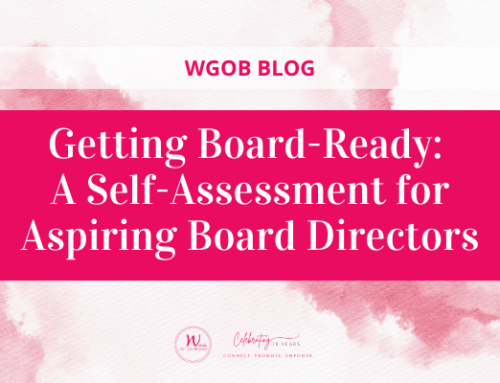Women Get On Board Inc. (WGOB) is a member-based company that connects, promotes and empowers women to corporate boards.
On June 10, WGOB hosted a digital webinar in partnership with Gowling WLG. The webinar featured a panel discussion, as well as breakout networking groups. The panel offered advice for board directors on matters related to nominating and corporate governance committees.
Deborah Rosati, FCPA, FCA, ICD.D, Corporate Director, Founder & CEO of WGOB, kicked off the panel by introducing the moderator, Alison Gray. Alison is a partner at Gowling, where she maintains her diverse commercial litigation practice. She also serves on the boards of the Association of Women Lawyers and Calgary Legal Guidance. To begin the conversation, Alison introduced the members of the panel:
- Judith Athaide: Professional engineer and corporate board director
- Patricia McLeod: Lawyer and corporate board director
- Gregory Peterson: Senior partner at Gowling WLG
The discussion focused on exploring the role of Nominating & Corporate Governance Committees (NCGCs) and their impact at the board table. What is the role of an NCGC? And how do these committees ensure that they are operating as effectively as possible?
What is the role of the Nominating & Corporate Governance Committee?
The primary roles of the NCGC are:
- To identify director candidates to be elected at a board’s annual general meeting
- To recommend corporate governance principles and practices
- To assess and evaluate the effectiveness of the board
Gregory explained that the role of the NCGC has dramatically changed over the past few years. These committees have increased in importance and now receive elevated expectations for their performance and effectiveness.
“I remember earlier in my legal career, nominating and governance committees were sarcastically referred to as ‘nominal committees.’ That’s because directors who didn’t have sufficient financial or industry knowledge for audit or the compensation committees were often placed on NCGC committees,” said Gregory
This attitude has evolved. Thanks to new scrutiny from investors—who are demanding change on environmental, social and governance (ESG) matters and diversity & inclusion—NCGCs have been spotlighted.
For this reason, NCGCs have a more significant impact on board decisions than ever before.
What makes an effective NCGC?
With these committees becoming more prominent and relevant, NCGCs must be as effective as possible.
Judith explained that efficacy starts with a strong committee chair. She says that chairs should be experienced leaders who listen more than they speak. Effective chairs understand how to draw out the best performance from the people around the table and lead the committee toward “reasoned and deliberated consensus.”
Every member of the committee should ensure they have a strong understanding of the strategy of the organization. To be sure that an NCGC is developing policies and structures that are right for the company, the members must understand the company’s unique culture and goals.
The panelists emphasized the importance of strong organization on the committee. Chairs should establish clearly defined roles, terms of reference and strong work plans to maximize effectiveness.
Lastly, Judith mentioned that NCGC members must be up to date on all relevant securities legislation and regulation. With the business landscape constantly evolving, directors must keep an eye on governance trends as they apply to their organization.
How should a board recruit new members and onboard them?
The members of the panel explained that every board and selection process is different.
“That is going to be a process that is unique to the organization and board,” said Patricia.
However, there are common best practices to follow. First and foremost, NCGCs should search for diverse directors with “merit,” meaning directors must bring strong business acumen and expertise. Additionally, they should demonstrate ethics, sound judgment, diplomacy and a willingness to participate in difficult conversations.
Patricia also suggested that NCGCs resist the impulse to methodically fill every skillset in the board’s skills matrix. In addition to core skills, all directors should be able to meet the duties of a director, and a good understanding of the industry and the nature of the company.
Increasingly, shareholders are looking to see more diverse boards. As Judith explained, this is because research has shown that diverse boards outperform their peers and create higher returns for investors compared to boards with more homogenous memberships.
If the committee is having trouble finding a diverse pool of candidates, they should expand their search and widen the posting parameters. For example, instead of considering only CEOs in their given industry, the committee could expand the search to include other experienced executives and business leaders in the sector.
“If you’re looking for candidates and they’re all starting to look like you, you’ve probably put too much emphasis on merit,” said Judith. “Start fishing in other ponds.
What emerging issues should NCGCs keep in mind?
As all three panelists pointed out, NCGCs are responsible for more issues than ever before. In addition to nominating directors and overseeing board governance, the committees are often responsible for engaging shareholders, monitoring corporate culture and acting on ESG matters.
Judith and Gregory both identified the importance of listening to the needs of shareholders, especially with the rise of activist investors in the corporate landscape. Failure to engage shareholders and answer questions appropriately may result in problems down the line.
Looking ahead, the NCGC will likely continue to grow in importance. For directors interested in participating in the front lines of board governance, serving on an NCGC could be a rewarding experience.
Are you interested in learning more about effective boards and governance? Join us for our next Women Get On Board Webinar on July 21, called Is the board helping the business keep pace? The webinar will feature Kristy Carscallen, Canadian Managing Partner, Audit at KPMG LLP and Janet Rieksts Alderman, Partner, Risk Consulting and Co-Leader, Board Leadership Centre at KPMG LLP. Register here.






